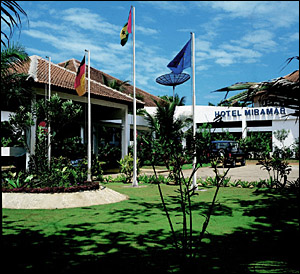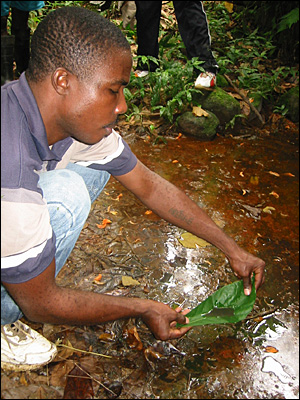Island in an Oil Boom
By David Hecht
Part 1, 2, 3, 4
 | The Hotel Miramar in Sao Tome
courtesy sao-tome.com |
Every boomtown in the tropics has a spot like the Miramar Hotel: a palm-shrouded gathering place where everyone from heads of state to embezzlers wheel and deal. Times are good for Miramar's co-owner, Manfred Galland, a German who's lived in Africa for more than 40 years.
"Before, we used to be 30 percent full," says Galland. "Now we're most of the time full, full, full. Before, we didn't have anything except bananas and cacao. But now with oil, everybody wants to come."
Sao Tome is one of the world's poorest countries. It's a former Portuguese colony isolated 180 miles off the western coast of Africa. Geologic surveys report the island could be sitting on billions of barrels of oil. Some say the oil could make millionaires out of every islander.
"The amount is enormous," says Galland. "When you think that there are 120,000 or 140,000 people on this island. Where is it all going to go?"
All of a sudden, Sao Tome is entering the global marketplace. Galland sees lots of big shots coming through his hotel, trying to drum up business.
"Swedish companies looking for telecommunications," says Galland. "Belgian companies: construction, Taiwanese (are) very much involved."
In February, a consortium led by Chevron-Texaco signed a deal to explore a tract of ocean floor off Sao Tome. The government's $55 million take of the signing bonus is equal to its annual budget.
The United States is also looking more closely at Sao Tome. Washington recently assigned a military attaché to the island. The United States hopes to build up Sao Tome's army, which currently has no planes, no boats, not even a car. The reasons for American interest are clear. Western Africa produces a sweet crude that's easily refined into lead-free gasoline. And most countries here are not OPEC members, so they're not bound to its production quotas. David Goldwyn, a development consultant with Goldwyn and Associates in Washington, says another factor is that global oil production is stretched to the limit.
"That means that if a bomb goes off in Saudi Arabia or there's a strike in Venezuela," says Goldwyn, "we don't have too many places to go to keep oil from going to $75 a barrel and that means that every drop of oil is important and the 15 percent of U.S. imports that come out of West Africa is indispensable."
That number is expected to approach 25 percent as Sao Tome's oil starts to flow.
 |  | A Sao Tomian demonstrates the local method of extracting oil. |
But for now, the only place to find local crude is in the dense rainforest a few miles from the Miramar hotel. A guide leads me to a clearing where oil bubbles up from the ground. It smells strange.
"They call it 'oil water,' agua petróleo." says the guide.
Local legend has it that this slimy stuff is the excrement of a vengeful spirit. In a nearby village, young men in shorts and T-shirts sit outside a former plantation, whiling away their time.
Portuguese landowners abandoned cacao plantations like this after Sao Tome's independence in 1975. Families now squat in the ruins. These young men are poor, and they expect they'll stay poor despite the discovery of oil.
"We are poor. The big men will take all the money," says one of the young men speaking through a translator.
Many Sao Tomeans share this belief that oil profits will be stolen. And for good reason, says William Easterly. As an economist at the World Bank, Easterly saw first-hand the squandering of aid money and oil profits.
"Not far from Sao Tome is Nigeria," says Easterly, "which has had $300 billion worth in oil revenue since discovering oil. Today, it has a lower income per person than it did when it discovered oil. Unfortunately that's been a huge pattern. All sorts of people start circling like sharks, trying to get their hands on the money. Unfortunately the consequences are that the money doesn't reach the ordinary people."
Go to Part 2
| 


